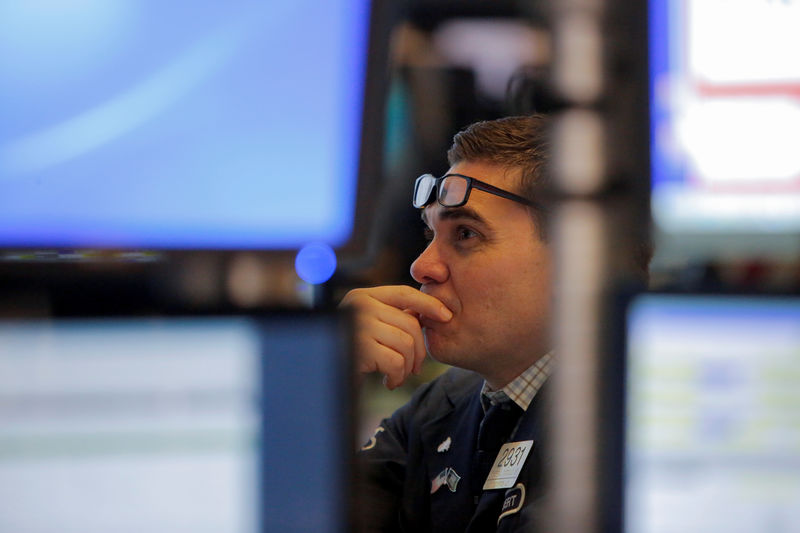 © Reuters.
© Reuters.By Noreen Burke
Investing.com — Financial markets in mainland China are set to reopen on Monday, after the holiday for the Lunar New Year was extended by the government amid the Coronavirus outbreak. Investors will continue to monitor the global economic fallout from the virus’s progression, which has largely overshadowed earnings season so far. Disney , Alphabet and Twitter are among the biggest names to report this week, while the economic calendar features the first U.S. jobs report for 2020. Meanwhile, the Reserve Bank of Australia might deliver a surprise rate cut. Here’s what you need to know to start your week.
- China to play catch-up to global market selloff
Financial markets in the Chinese mainland are set to reopen on Monday, with investors bracing for a volatile session playing catch-up to global markets, which have sold off sharply amid concerns over the economic repercussions of the outbreak. The country’s central bank is gearing up for more stimulus measures on Monday to boost liquidity and support companies affected by the virus, which has so far claimed 305 lives, all but one in China.
Efforts to contain the spread of the virus have caused major disruptions and look set to deal a major blow to growth in China and globally. It comes after last year’s trade war between Washington and Beijing knocked China’s GDP down to 6% in 2019 and acted as a drag on global growth, which slowed to 3% last year from 3.6% in 2018.
- Global economic impact of virus
China’s central role in the in the global supply chain means that the ripple effects from the virus are being felt far and wide and countries that are heavily dependent on Chinese demand have seen steep drops in their currencies. The ended down around 5% in January, its worst month since 2016.
Global stocks have tumbled, with Wall Street’s major indexes dropping more than 1.5% on Friday, sealing their worst week in six months.
Economists fear the coronavirus could have a bigger impact than Severe Acute Respiratory Syndrome (SARS), which killed about 800 people between 2002 and 2003 at an estimated cost of $33 billion to the global economy, since China’s share of the world economy is now far greater.
Oil prices capped off their worst monthly loss in more than a year on Friday, while safe haven play notched up its best month in five.
- Earnings season nears halfway mark
Almost 100 companies traded on the are due to report earnings this week, which means that approximately two-thirds of the index will have reported by Friday, while two components, Disney (NYSE:) and Merck (NYSE:), are on the slate.
Disney’s fourth quarter earnings report, due after the close on Tuesday, will include the first official subscriber figures for its Disney+ streaming service which launched halfway through the quarter. Investors will also be on the alert for any indications of the impact of the coronavirus outbreak on theme-park attendance after Shanghai Disneyland was indefinitely shut down late last month.
Meanwhile, Google parent Alphabet (NASDAQ:) will report on Monday, Snap (NYSE:) is due to report numbers on Tuesday while Uber (NYSE:) and Twitter (NYSE:) follow on Thursday.
- U.S. jobs report likely to play second fiddle to virus fears
Friday’s U.S. nonfarm payrolls report for January is forecast to show jobs growth of , while wage growth is expected to tick up to after slipping back to 2.9% in December. Any signs of sluggish wage growth could foreshadow weakness in consumer spending.
Monday’s is expected to see a small uptick from better regional data in the wake of the phase 1 trade deal between the U.S. and China. Several Federal Reserve officials are due to deliver remarks this week after keeping rates on hold at their January meeting and U.S. President Donald Trump is set to make his State of the Union speech on Tuesday.
In the euro zone, numbers for December are due on Wednesday, while European Central Bank President Christine Lagarde is to testify on the economic outlook before European lawmakers on Thursday.
- RBA to cut rates?
The RBA is due to announce its latest on Tuesday and the bushfire emergency along with the threat to the economic outlook from the Coronavirus (and its impact on China) mean that a 25 basis point rate cut could be on the cards, despite a recent welcome dip in the country’s unemployment rate.
Even if policymakers hold off on cutting rates for now a more dovish sounding rate statement could indicate that a cut is imminent.
Australian inflation edged higher in the final quarter of 2019 but remained below the RBA’s 2-3% target band. Persistent weakness in inflation was one reason the RBA cut interest rates three times last year to an all-time low of 1.75%.
–Reuters contributed to this report
Source: Economy - investing.com



